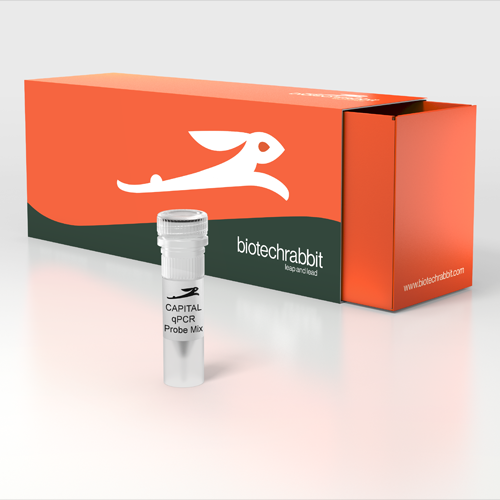Specifications
SUBCLASS
CAPITAL qPCR Mixes
APPLICATION
Standard and fast cycling qPCR with rapid extension rate for early Ct values
For use on a wide range of probe technologies including Taqman®, Molecular Beacons® and Scorpion® probes
*USAGE / SAFETY STATEMENT
For laboratory research and development purposes only.
DISCLAIMER
All biotechrabbit products are designed for use for research purposes only (RUO). biotechrabbit does not assume any warranty regarding the design, merchantability or fitness for a particular purpose of the product, especially, but not limited to, for any in vitro diagnostic usages of the products. It is the sole responsibility of the customer to obtain the required approvals for any uses from the competent authorities or notified bodies. The product is not suitable for administration to humans or animals. biotechrabbit products are to be used by trained laboratory personnel who are familiar with laboratories equipped to perform life science research. biotechrabbit products may contain chemicals which are harmful if misused. Due care should be taken with all products to avoid direct contact with components that are potentially harmful.
biotechrabbit is not responsible for injury or damages resulting from the use or misuse of any of its products.The customer shall respect restrictions of the local law. The Customer is responsible for requesting and adhering to information provided in product material safety data sheet (MSDS) pertaining to any product hazards which may exist.
QUALITY CERTIFICATION / COMPLIANCE
EN ISO 13485 for the scope of design and development, production, marketing and distribution of molecular biology products, proteins and reagents for in-vitro diagnostics.
EN ISO 9001 for the scope of design and development, production, marketing and distribution of molecular biology products, proteins and reagents.
biotechrabbit has always been committed to highest quality standards for development, production and quality control. The ISO 13495 and ISO 9001 certifications validate to our customers that biotechrabbit products are manufactured and distributed according to these high quality levels.
The ISO 13485 certification was driven by our relationships to in-vitro diagnostics companies who are using biotechrabbit enzymes and reagents to manufacture diagnostic test kits. The quality management according to ISO 9001 covers the broader product range of our portfolio, assuring end customers and distribution partners our reliable and effective quality processes.
KIT COMPONENTS
Component: Primer Mix (Reverse and Forward) (Volume: Variable ; Final concentration: 100–400 nM)
Note: Too high primer concentrations result in unspecific amplification and should be avoided.
Component: Specific Probe (Volume: Variable ; Final concentration: 200 nM)
Component: Template DNA (Volume: Variable ; Final concentration: 10 pg – 100 ng)
Note: Use diluted or undiluted cDNA from less than 1 µg RNA
Component: 4X CAPITAL qPCR Probe Master Mix (Volume: 5 µl ; Final concentration: 1×)
Component: Nuclease free water (Volume: Variable ; Final concentration: )
Total volume: 20 µl
Gently mix the reactions without creating bubbles (do not vortex). Bubbles will interfere with fluorescence detection.
Place the reaction into the PCR cycler.
INCLUDED COMPONENTS
CAPITAL qPCR Probe Master Mix (Composition: Optimized 4X QPCR Probe Master Mix)
LROX / HROX mixes (Composition: Rox incorporated in the mix in low / high concentration)
FUNCTIONAL ASSAY
Mix tested functionally in qPCR.
BASIC PROTOCOL
Keep the master mix protected from light until you use it.
Aliquot the master mix to minimize freeze-thaw cycles and light exposure.
Thaw on ice and mix very well all reagents. Assemble and keep all reactions on ice.
Use only high quality optically clear reaction plates and seals designed for fluorescence applications.
Do not use corner wells or use a more robust seal.
Reserve plate positions for positive (control DNA) and negative (water or buffer) controls.
First pipette the primer mixture, then add the template and last the Master Mix.
Before preparing mixes, calculate the volume needed according to the reaction number plus one extra.
To have a better correlation, run the reactions in triplets.
CYCLING PROGRAM
Step: Reverse Transcription (Temperature: 50°C ; Time: 10 min ; Cycles: 1)
Step: Initial activation (Temperature: 95°C ; Time: 3 min ; Cycles: 1)
Step: Denaturation (Temperature: 95°C ; Time: 10 s ; Cycles: 40-45)
Step: Annealing/Extension* (Temperature: (60-68°C) ; Time: 30 s ; Cycles: )
*Recommended annealing/extension temperature is primer Tm +2°C. Use gradient PCR to optimize the annealing temperature. Do not use temperatures below 60°C. Do not exceed 30 seconds.
For melt analysis refer to instrument instructions.


